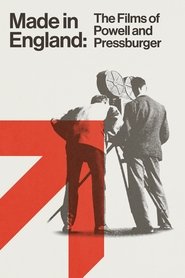This would be a strong bonus feature if it were included on a Criterion disk for any of the Archer's films, but despite being a huge fan of these works, it comes up a little short as a standalone, feature-length documentary. Given that Made in England is presented as the humble personal thoughts of Martin Scorcese, it regrettably endorses the notion that you need a Famous Director to grant you permission to watch and love lesser-known films from any culture not of your own. and however admirable it is to renew interest in The Archer's work, this is of course somewhat unfortunate. Indeed, the documentary seems unaware that it is inherently contradictory on this point: Scorcese spends considerable running time recounting his (now well-worn and possibly rose-tinted memories) of watching these films repeatedly in the SS when he was young — precisely a time when the documentary claims they were essentially unknown, thought of as 'lesser' works and/or mutilated by the censors. The idea of requiring the imprimatur from some cultural gatekeeper also seems to be at significant variance with Scorcese's highly creditable work on the World Cinema Project as well.
There is, in addition, the complete absence of additional viewpoints, let alone dissenting voices. Where are Sally Potter and Joanna Hogg talking about the influence on their works, for example, let alone Thelma Schoonmaker who is still relatively underexplored in Scorcesiana. And I'd love to have seen Mahesh Rao as a talking head as well, particularly on the complicated racial and Empire-inflected dynamics of these films. Admittedly, there is little completely novel for die-hard Powell and Pressburger fans to learn anew, and the pleasure is mostly in seeing clips of them up on a big screen: I was vibrating in my seat just hearing the first two sentences of Wahlbrook's speech from 49th Parallel (1941). But it would have been better if a film called Made in England said something about the film's or Scorcese's shifting idea of 'Englishness'. Indeed, despite what he claims, I'm sure Scorcese jolly well does understand what people mean when they say "English romanticism", and the documentary does not engage with the endlessly fascinating politics of the movies under discussion, except when it, say, pertains to the United States, can allude to recognisable names such as Winston Churchill or semi-technical 'political' concerns such as wartime propaganda offices.
The recent book by Nathalie Morris and Claire Smith, Romantic Imaginations, seems to be much better in almost all regards, not only by including other voices, but also through due credit to the huge team that worked around The Archers themselves. The photographs are fantastic also. Still, Made in England passes the ultimate test of making you want to watch these films all over again: Scorcese is especially perceptive on yearning love and the audacious editing decisions in The Life and Death of Colonel Blimp (1943), the "flat champagne" of Oh... Rosalinda!! (1955) and his allusion to Robert Bresson in his interpretation of the gondola scene from The Tales of Hoffman (1951) — it is, indeed, pure cinema, and could not work in any other artform.
If Made in England is on one level an outside observer's analysis of one highly consequential cinematic partnership—Powell and Pressburger's midcentury one—the film is on another an insider account of a second such relationship—the late-century one between Scorcese and Powell. Common to both the movie's central pairings rather than particular to one, Powell consequently looms large within Made in England to a degree that Pressburger cannot.
— Jonathan Murray (Cineaste, Spring 2025)

